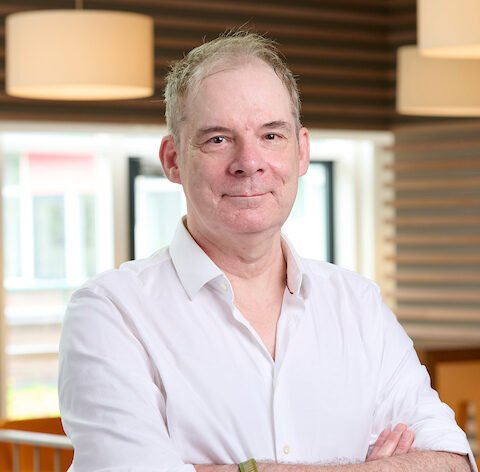This interview was published on the website of ICT Research Platform Netherlands (IPN) in November 2024.
How did you end up in computer science?
‘When I first went to university back in 1980, that was the last year there was no separate computer science program. But if there would have been one, I probably would not have chosen it anyway. When in high school, I did not have an Atari at home, I was mainly interested in subjects like astronomy, mathematics, physics, and chemistry. Eventually, I decided to go for a degree in mathematics. Since I had always been interested in the relevance of science for society, I opted for a technical university and enrolled in Eindhoven University of Technology. During my studies, I attended lectures by Edsger Dijkstra, who taught about the formal side of computer science. I was hooked, and decided to look for a graduation project in that direction.’
What sort of topics have you been working on during your career?
‘My PhD project at Utrecht University was about dynamic graph algorithms, which was a subject on the interface between mathematics and computer science. During my postdocs at Princeton University, Utrecht University and Leiden University, I gradually developed a broader interest in evolutionary algorithms and slowly but surely drifted further away from mathematics.
In 1997, I was appointed at CWI to start a new group on Evolutionary Computation and Applied Algorithmics. Together with Hans Amman from the University of Amsterdam, I then dived into algorithms for economic markets. This led to the development of market-based models for various application areas, ranging from logistics management and agent-mediated bargaining, to patient scheduling in hospitals.
In the meantime, the concept of software agents started to gain traction, and I became interested in so called non-cooperative, or competitive, agents. Some 15 years ago, my combined experience with economics and learning agents turned out to be of great value for the energy system, and more specifically, smart grids. I have been working on non-cooperative agents and market-based models for energy networks ever since.’
What does your research entail?
‘I look at market mechanisms for energy networks. A main question is: How can we reach a stable situation for the electricity network with renewable energy sources that is balanced, free from congestion and fair for all stakeholders, and that is also able to deal with uncertainties? I look at the fundamental concepts of such a system. For example, we study fairness concepts for congestion management. Not everyone can use a maximum of energy at the same time. Who will you cut down and based on what criteria? How can we comply with fairness norms in algorithmics, like in an envy-free way? And how can we define an aftermarket, where people can trade their share of fairness if they want?
The nice thing about this research is that it brings together a wide variety of fields. We have to reason about social norms, define the rules of the game when it comes to negotiations between the different stakeholders, and supply the mathematical proofs that every participant will do the right thing. In addition to this, we have to come up with solutions that can be executed on systems with limited computing power, and as fast as possible. Because no one wants to wait for a day before the washing machine has calculated what would be the best time to turn on, nor does anyone want to install a supercomputer to be able to manage their energy usage.’
What is it that fascinates you in the subject?
‘Sustainability of and congestion effects in energy systems form a challenging combination of fundamental computer science, electrical engineering and societal relevance. Ever since I was a kid, I wanted to deep dive into the fundamentals of problems that are of relevance to society. And I have always been curious about other fields, and wanted to gain broader knowledge. In my work, I now combine economical concepts like bidding strategies from game theory with the fundamentals of computer science and apply them to problems in electrical engineering. That is both intellectually very stimulating, and highly relevant.’
What is your scientific ambition for the coming years?
‘To further build on the fundamentals from computer science and mathematics, and supply rigorous proofs that our solutions are workable. In addition to that, I will also work on some more application oriented projects. For example, one of my current PhD students that I supervise with Valentin Robu is involved in the Growth Fund programme GroenvermogenNL, where we look at how to integrate hydrogen in electricity networks to temporarily store renewable energy. And another PhD student is looking at using game theory to investigate attack and defend mechanisms in a cyber security setting.’

